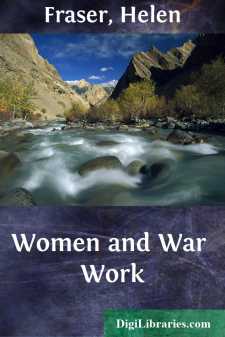Categories
- Antiques & Collectibles 13
- Architecture 36
- Art 48
- Bibles 22
- Biography & Autobiography 813
- Body, Mind & Spirit 142
- Business & Economics 28
- Children's Books 17
- Children's Fiction 14
- Computers 4
- Cooking 94
- Crafts & Hobbies 4
- Drama 346
- Education 46
- Family & Relationships 57
- Fiction 11829
- Games 19
- Gardening 17
- Health & Fitness 34
- History 1377
- House & Home 1
- Humor 147
- Juvenile Fiction 1873
- Juvenile Nonfiction 202
- Language Arts & Disciplines 88
- Law 16
- Literary Collections 686
- Literary Criticism 179
- Mathematics 13
- Medical 41
- Music 40
- Nature 179
- Non-Classifiable 1768
- Performing Arts 7
- Periodicals 1453
- Philosophy 64
- Photography 2
- Poetry 896
- Political Science 203
- Psychology 42
- Reference 154
- Religion 513
- Science 126
- Self-Help 84
- Social Science 81
- Sports & Recreation 34
- Study Aids 3
- Technology & Engineering 59
- Transportation 23
- Travel 463
- True Crime 29
Women and War Work
by: Helen Fraser
Description:
Excerpt
CHAPTER I
THE SPIRIT OF WOMEN
TO WOMEN
Your hearts are lifted up, your hearts
That have foreknown the utter price,
Your hearts burn upward like a flame
Of splendour and of sacrifice.
For you too, to battle go,
Not with the marching drums and cheers,
But in the watch of solitude
And through the boundless night of fears.
And not a shot comes blind with death,
And not a stab of steel is pressed
Home, but invisibly it tore,
And entered first a woman's breast.
From LAWRENCE BINYON's "For the Fallen."
The spirit of women in this greatest of world struggles cannot, in its essence, be differentiated from the spirit of men. They are one. The women of our countries in the mass feel about the issues of this struggle just as the men do; know, as they do, why we fight, and like them, are going on to the end. The declarations of our Government as to conditions for peace are ours, too, and when we vote, we shall show the spirit of women is clearly and definitely on the side of freedom, justice and democracy.
Our actions speak louder than any words can ever do, and the record of our women's sacrifices and work stand as great silent witnesses to our spirit. There is nothing we have been asked to do that we have not done and we have initiated great pieces of work ourselves. The hardest time was in the beginning when we waited for our tasks, feeling as if we beat stone walls, reading our casualty lists, receiving our wounded, caring for the refugees, doing everything we could for the sailor and soldier and his dependants, helping the women out of work, but feeling there was so much more to do behind the men—so very much more—for which we had to wait. We did all the other things faithfully and, so far as we could, prepared ourselves and when the tasks came, we volunteered in tens of thousands, every kind of woman, young, old, middle-aged, rich and poor, trained and untrained, and today we have 1,250,000 women in industry directly replacing men, 1,000,000 in munitions, 83,000 additional women in Government Departments, 258,300 whole and part-time women workers on the land. We are recruiting women for the Women's Army Auxiliary Corps at the rate of 10,000 a month and we have initiated a Women's Royal Naval Service. We have had the help of about 60,000 V.A.D.'s (Voluntary Aid Detachment of Red Cross) in Hospitals in England and France, and on our other fronts, in addition to our thousands of trained nurses.
The women in our homes carry on—no easy task in these days of shortages in food and coal and all the other difficulties, saving, conserving, working, caring for the children, with so many babies whose fathers have never seen them, though they are one to two years old, and so many babies who will never see their fathers.
Some of our women have died on active service, doctors, nurses and orderlies. Our most recent and greatest loss is in the death of Dr. Elsie Inglis, the initiator of the Scottish Women's Hospitals, who died on November 26th, three days after she had safely brought back her Unit from South Russia, which had been nursing the Serbians attached to the Russian army....


